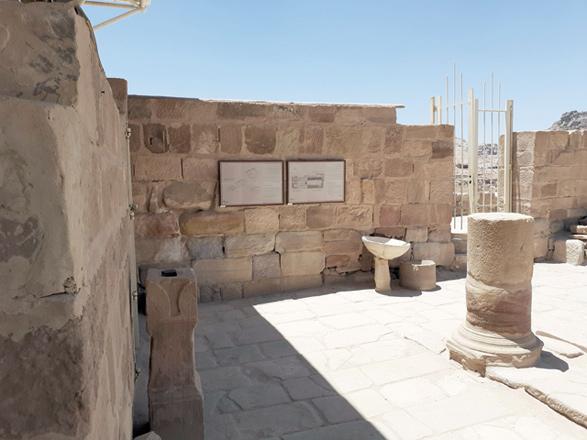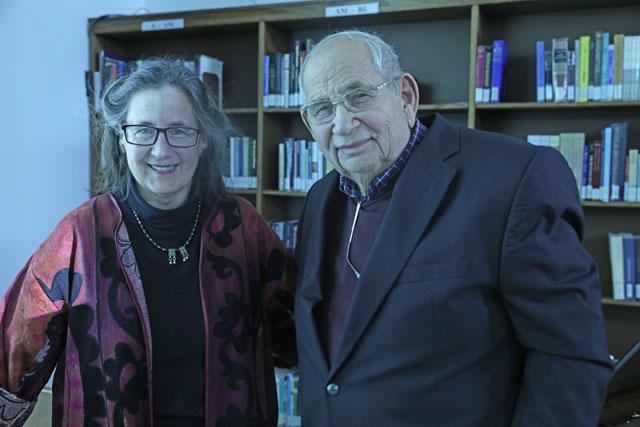You are here
A life’s passion leads to Jordan: one archaeologist’s commitment to preserving the past
By Saeb Rawashdeh - Jan 19,2017 - Last updated at Jan 19,2017

Barbara Porter
AMMAN — Long before becoming head of the American Centre of Oriental Research (ACOR) in Jordan, Barbara Porter was passionate about the archaeology and history of the Arab world.
Daughter of Dwight Porter, US ambassador to Lebanon between 1965 and 1970, she spent her formative teenage years with her family in 1960s Beirut.
“I grew up in Lebanon in the 1960s and worked in Syria in the 1980s on excavations,” Porter explains.
“I also excavated in the Jordan Valley at Tal Mazar in 1977, on a University of Jordan project, and thus worked directly with Jordanian archaeologists and was also introduced to the American Centre of Oriental Research [ACOR],” she recalls.
Established in 1968, ACOR is a non-profit institution, although USAID has been the primary funder of its major archaeological projects since the late 1980s.
In 2006, five years after gaining her PhD from Columbia University, Porter became the fifth long-term director of ACOR.
She succeeded Pierre Bikai, and it was under Bikai’s 15-year tenure that ACOR’s publication programme began, led by Patricia Bikai, with “The Mosaics of Jordan” by the late Father Michele Piccirillo the first of many books published.
Each director has
his/her own personality, style and legacy, Porter explains in a recent interview with The Jordan Times, adding that for almost 50 years, ACOR has assisted and taken part in many projects which have served as a bridge between both local and international scholars.
“ACOR has been involved in projects in Jordan from the outset, and they range in terms of chronological periods as well as geography, namely from [the] north [the Rest House at Um Qais] to Aqaba [the Ayla Archaeological Park],” Porter explains.
“Examples include the Amman Citadel restoration of the Roman Temple, which now stands as an iconic element of the Amman skyline, and the Madaba Archaeological Park, which has preserved many mosaic pavements readily visited in that city,” she says.
2016 marked the 10th anniversary of her leadership of ACOR:
Porter singles out the excavation and preservation of the Petra church, which began in 1991, as ACOR’s most successful project.
“An extraordinary part of those excavations was the discovery in December 1993 of an archive of 6th century papyrus documents written in Greek that have been studied by scholars and published in multiple volumes by ACOR, starting in 2002,” she underscores.
The fifth and final volume will appear in 2017, the scholar says, adding that ACOR “to this day” works with the Petra Archaeological Park and the Department of Antiquities to continue to conserve the church complex.
“I have frequently lectured on the topic of preserving and presenting the Petra Church, both in Jordan and in many other countries,” Porter emphasises.
Another successful project focuses on the Temple of the Winged Lions, a Nabataean religious complex, located near the Petra Church.
When ACOR celebrated its 40th anniversary in 2008, its board of trustees inaugurated the Jordanian Graduate Student Scholarship Programme, which has supported almost 30 students, Porter says.
As well as providing information on projects and programmes, ACOR’s website is also a repository for around 50,000 books and journals, showcasing the range of the organisation’s work over the last five decades.
A new programme, the ACOR Conservation Cooperative, was launched in fall 2006.
“ACOR’s conservation technician Naif Zaban assists archaeological projects in terms of restoring ceramic material and cleaning ancient coins — all to further their study and potential display in the museums of Jordan,” Porter explains.
“To date, this initiative has assisted more than 50 projects, and he was also able to provide his expertise to the Jordan Museum, in which a number of objects found by excavations conducted under ACOR are on display,” the director adds.
This year, ACOR is already preparing to mark its 50th anniversary in 2018.
“There is a wonderful team behind every aspect of what we do; our endeavours include various kinds of outreach, such as our monthly lectures, which provide the venue to share new information or ideas on Jordan’s past,” Porter says.
ACOR’s mission statement, restated in 2011 by the ACOR board of trustees, is “to advance knowledge of Jordan past and present”.
“To do this we confirm ACOR’s dedication to offering scholarships, providing an up-to-date major research library, connecting scholars, publishing books, facilitating training programmes, assisting field projects and creating an environment that remains stimulating for researchers,” Porter underlines.
“Although we are historically known for our role in archaeology and heritage, many of our researchers are involved in modern topics that stress our interest in Jordan’s present.”
Related Articles
AMMAN — The role of American Centre of Research (ACOR) in Amman in “salvaging the Jordanian cultural heritage” took centre stage during a re
AMMAN — A presentation delivered on Wednesday by Director of the American Centre of Oriental Research (ACOR) Barbara Porter aimed to inform
AMMAN — Given the numerous threats facing archaeological and cultural heritage sites in Jordan and the region, whether from war, development
















